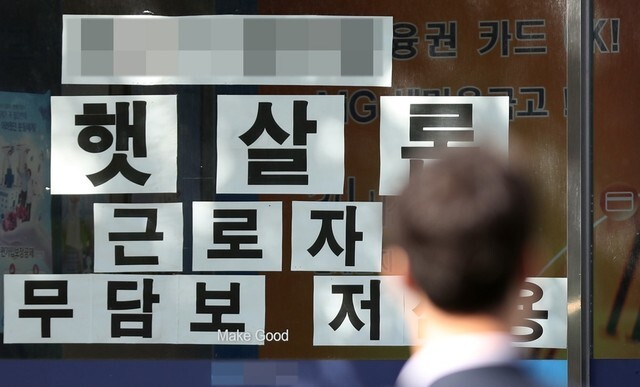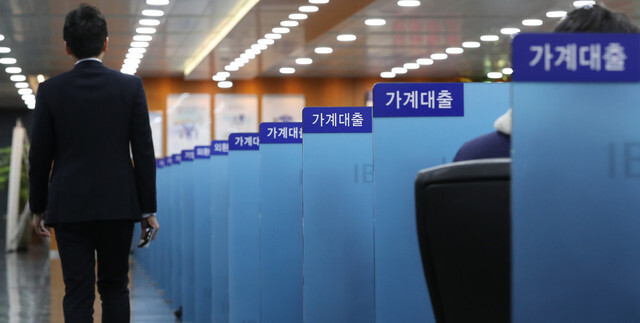hankyoreh
Links to other country sites 다른 나라 사이트 링크
Mother and 4 daughters commit suicide due to financial troubles

The South Korean police announced on Nov. 12 that a 70-something woman and her three daughters, all in their 40s, who were found dead in an apartment in Seoul’s Seongbuk District had apparently decided to end their lives because of financial difficulties.
“The four women had debt from banks and other financial institutions, and letters demanding debt repayment and a suicide note were found at the scene. Given those circumstances, we presume this tragic incident was caused by the family’s financial problems,” said an official at the Seoul Metropolitan Police Agency.
The fact that the family of four had taken out loans from non-banking financial institutions means that banks were no longer willing to give them credit. The police said they hadn’t determined whether the family had taken out private loans as well.
In July, the mother and one of her daughters visited a local government office in order to move their basic pension payments into a bank account that couldn’t be placed under attachment. That was when the family’s situation apparently became desperate: they started falling behind on their monthly national health insurance premiums, which they’d kept up with until that point. So why didn’t the family ask for help?
Mental pain goes unseenExperts in debt adjustment said the family was likely under extreme psychological duress because of harassment from debt collectors. The fact that debt repayment reminders were found at their house means they were regularly being contacted to pay back their loans, through phone calls, text messages, and house calls.
“If a debtor goes into arrears on their payments, they’ll get phone calls at all hours of the day. That makes it difficult to run a business or do one’s work and can eventually cause people to lose their livelihood. The Fair Debt Collection Practices Act is supposed to mitigate harm from excessive debt collection, but its provisions are so vague that it’s hard to get a conviction for specific behavior. The Financial Supervisory Service has guidelines that limit the number of times that debtors can be contacted about repaying their debts, but in reality those guidelines aren’t kept,” said Hong Seok-man, secretary-general at Jubilee Bank.
Hong said that the debtors he’s met personally have low self-esteem and little energy to become self-sufficient or accomplish much of anything. Such individuals also tend to distrust government institutions, because they’ve been treated rudely and often told “no” while trying to raise funds or get legal advice. The family in question was presumably in a similar state of mind.
“When the woman and one of her daughters came to the neighborhood office in July, one of the staff asked them if something was wrong. But the daughter had a look of embarrassment and was reluctant to talk, and she wouldn’t ask any more questions, apparently afraid of being an inconvenience,” said an official at the Seongbuk District Office.
Studies show that people shouldered with heavy debt not only face financial difficulties but also see their social relationships, as well as their physical and mental health, deteriorate. For such reasons, the Japanese government’s policy prevention efforts give considerable weight to heavily indebted individuals, those who’ve taken out more debt than they’re capable of repaying.
Park Jeong-man, director of Seoul’s financial welfare counseling center, said that this tragic incident could help Koreans realize that their society, structurally speaking, doesn’t make people feel that they can get back on their feet after any failure. Even when the courts are handling debt adjustment, debtors still get the impression that they ought to be punished harshly for breaking the social code of trust and ethics. In such a situation, it’s difficult for them to feel confident about making a comeback. Serious reflection should also be given to the tendency to heap reproach upon delinquent debtors while going easy on creditors who loan money to the poorest of the poor, even when they’re fully aware that such people are incapable of repaying their debts.

The Ministry of Health and Welfare operates an emergency welfare system that covers living costs and medical care for low-income earners who find themselves in trouble. Because there are major loopholes in the basic living security program, which is supposed to be the last line of defense, and because it takes time for the government to approve enrollment in that program, a short-term solution is necessary.
But because this family of four was running an online store, they probably wouldn’t have qualified for benefits through the emergency welfare system. According to the Emergency and Support Act, assistance is only available to those facing business troubles, such as a fire at a workplace or a temporary or permanent closure, and none of those conditions applied.
That said, individuals can receive help with their living expenses through an emergency welfare system operated by the city of Seoul if they can demonstrate their financial difficulties. Even for people in similar situations, the availability of emergency welfare can depend upon their local government’s fiscal resources and even the public servant in charge of their case.
But even if individuals manage to somehow receive that aid, there’s little point if they can’t deal with their outstanding debt. Those who can’t see any way to pay back their debt can visit the Credit Counseling and Recovery Service, where they can apply for private debt adjustment with a bank (fast-track debt adjustment, pre-workout, or personal workout) or public debt adjustment through the courts (personal bankruptcy or debt rehabilitation).
Individuals can’t get help with these procedures at a local government office. However, Seoul and several other local governments have set up financial welfare counseling centers that provide debt counseling and help with adjusting debt and connecting residents with welfare programs. It’s uncertain whether the family of four visited such an organization.
Old-fashioned welfare fails to account for debtAmong the 1,321 individuals who visited the financial welfare counseling center in Seongnam for help with debt adjustment and other issues last year, 33.6% had no monthly income, 23.5% made less than 1 million won (US$856.42), and 22.6% made less than 2 million won (US$1,713). Five out of 10 had monthly income of less than 1 million won, but just four of 10 were on welfare. These figures show that, while welfare ought to be organically linked to the process of debt adjustment, the reality is otherwise.
“People try to look into residential and emergency welfare at local government offices, but connecting them isn’t easy,” said Kang Myeong-su, head of the Seongnam financial welfare counseling center.
Park Jeong-man reported a similar experience: “We’re only able to connect people to welfare about two or three times out of every 10. The government has a working-class finance program that provides loans to financially vulnerable sectors, but what we need isn’t debt but welfare,” he said.
How then can we prevent debt and other financial difficulties from driving people to contemplate suicide? What’s ultimately needed are measures that not only address financial issues, such as adjusting debt and preventing excessive indebtedness, but also cover other areas, including welfare, jobs, and psychological health. The government also needs to improve access by simplifying the complicated social security system.
“Excessive debt is a widespread issue: more people are going to the courts each year for personal rehabilitation and bankruptcy (134,000 in 2018) than to get a divorce (108,700 in 2018). Our welfare policy is based on an analysis of household income and assets, but we need to take into account household debt if we’re going to get a better view of the big picture,” said Park Jeong-min, a professor of social welfare at Seoul National University.
By Park Hyun-jung, staff reporter
Please direct comments or questions to [english@hani.co.kr]

Editorial・opinion
![[Editorial] Yoon must halt procurement of SM-3 interceptor missiles [Editorial] Yoon must halt procurement of SM-3 interceptor missiles](https://flexible.img.hani.co.kr/flexible/normal/500/300/imgdb/child/2024/0501/17145495551605_1717145495195344.jpg) [Editorial] Yoon must halt procurement of SM-3 interceptor missiles
[Editorial] Yoon must halt procurement of SM-3 interceptor missiles![[Guest essay] Maybe Korea’s rapid population decline is an opportunity, not a crisis [Guest essay] Maybe Korea’s rapid population decline is an opportunity, not a crisis](https://flexible.img.hani.co.kr/flexible/normal/500/300/imgdb/original/2024/0430/9417144634983596.jpg) [Guest essay] Maybe Korea’s rapid population decline is an opportunity, not a crisis
[Guest essay] Maybe Korea’s rapid population decline is an opportunity, not a crisis- [Column] Can Yoon steer diplomacy with Russia, China back on track?
- [Column] Season 2 of special prosecutor probe may be coming to Korea soon
- [Column] Park Geun-hye déjà vu in Yoon Suk-yeol
- [Editorial] New weight of N. Korea’s nuclear threats makes dialogue all the more urgent
- [Guest essay] The real reason Korea’s new right wants to dub Rhee a founding father
- [Column] ‘Choson’: Is it time we start referring to N. Korea in its own terms?
- [Editorial] Japan’s rewriting of history with Korea has gone too far
- [Column] The president’s questionable capacity for dialogue
Most viewed articles
- 1Months and months of overdue wages are pushing migrant workers in Korea into debt
- 2Trump asks why US would defend Korea, hints at hiking Seoul’s defense cost burden
- 3[Guest essay] Maybe Korea’s rapid population decline is an opportunity, not a crisis
- 4[Editorial] Yoon must halt procurement of SM-3 interceptor missiles
- 51 in 3 S. Korean security experts support nuclear armament, CSIS finds
- 6At heart of West’s handwringing over Chinese ‘overcapacity,’ a battle to lead key future industries
- 7Fruitless Yoon-Lee summit inflames partisan tensions in Korea
- 8[Column] Can Yoon steer diplomacy with Russia, China back on track?
- 9South Korea officially an aged society just 17 years after becoming aging society
- 10Under conservative chief, Korea’s TRC brands teenage wartime massacre victims as traitors